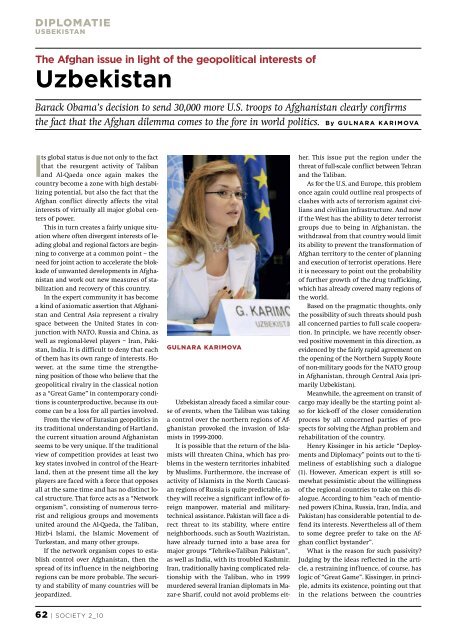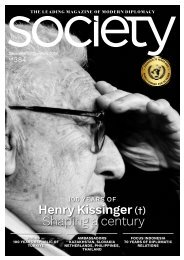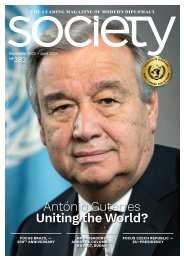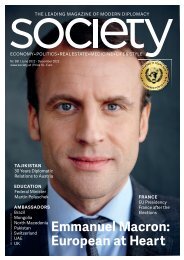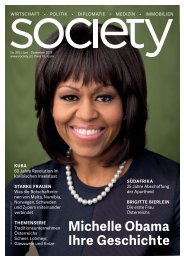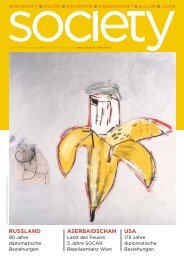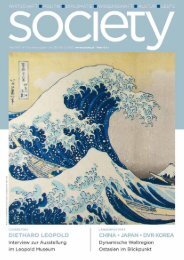SOCIETY 354 /2010
Sie wollen auch ein ePaper? Erhöhen Sie die Reichweite Ihrer Titel.
YUMPU macht aus Druck-PDFs automatisch weboptimierte ePaper, die Google liebt.
DIPLOMATIE<br />
USBEKISTAN<br />
The Afghan issue in light of the geopolitical interests of<br />
Uzbekistan<br />
Barack Obama’s decision to send 30,000 more U.S. troops to Afghanistan clearly confirms<br />
the fact that the Afghan dilemma comes to the fore in world politics. By GULNARA KARIMOVA<br />
Its global status is due not only to the fact<br />
that the resurgent activity of Taliban<br />
and Al-Qaeda once again makes the<br />
country become a zone with high destabilizing<br />
potential, but also the fact that the<br />
Afghan conflict directly affects the vital<br />
interests of virtually all major global centers<br />
of power.<br />
This in turn creates a fairly unique situation<br />
where often divergent interests of leading<br />
global and regional factors are beginning<br />
to converge at a common point – the<br />
need for joint action to accelerate the blokkade<br />
of unwanted developments in Afghanistan<br />
and work out new measures of stabilization<br />
and recovery of this country.<br />
In the expert community it has become<br />
a kind of axiomatic assertion that Afghanistan<br />
and Central Asia represent a rivalry<br />
space between the United States in conjunction<br />
with NATO, Russia and China, as<br />
well as regional-level players – Iran, Pakistan,<br />
India. It is difficult to deny that each<br />
of them has its own range of interests. However,<br />
at the same time the strengthening<br />
position of those who believe that the<br />
geopolitical rivalry in the classical notion<br />
as a “Great Game” in contemporary conditions<br />
is counterproductive, because its outcome<br />
can be a loss for all parties involved.<br />
From the view of Eurasian geopolitics in<br />
its traditional understanding of Hartland,<br />
the current situation around Afghanistan<br />
seems to be very unique. If the traditional<br />
view of competition provides at least two<br />
key states involved in control of the Heartland,<br />
then at the present time all the key<br />
players are faced with a force that opposes<br />
all at the same time and has no distinct local<br />
structure. That force acts as a “Network<br />
organism”, consisting of numerous terrorist<br />
and religious groups and movements<br />
united around the Al-Qaeda, the Taliban,<br />
Hizb-i Islami, the Islamic Movement of<br />
Turkestan, and many other groups.<br />
If the network organism copes to establish<br />
control over Afghanistan, then the<br />
spread of its influence in the neighboring<br />
regions can be more probable. The security<br />
and stability of many countries will be<br />
jeopardized.<br />
GULNARA KARIMOVA<br />
Uzbekistan already faced a similar course<br />
of events, when the Taliban was taking<br />
a control over the northern regions of Afghanistan<br />
provoked the invasion of Islamists<br />
in 1999-2000.<br />
It is possible that the return of the Islamists<br />
will threaten China, which has problems<br />
in the western territories inhabited<br />
by Muslims. Furthermore, the increase of<br />
activity of Islamists in the North Caucasian<br />
regions of Russia is quite predictable, as<br />
they will receive a significant inflow of foreign<br />
manpower, material and militarytechnical<br />
assistance. Pakistan will face a direct<br />
threat to its stability, where entire<br />
neighborhoods, such as South Waziristan,<br />
have already turned into a base area for<br />
major groups “Tehrik-e-Taliban Pakistan”,<br />
as well as India, with its troubled Kashmir.<br />
Iran, traditionally having complicated relationship<br />
with the Taliban, who in 1999<br />
murdered several Iranian diplomats in Mazar-e<br />
Sharif, could not avoid problems either.<br />
This issue put the region under the<br />
threat of full-scale conflict between Tehran<br />
and the Taliban.<br />
As for the U.S. and Europe, this problem<br />
once again could outline real prospects of<br />
clashes with acts of terrorism against civilians<br />
and civilian infrastructure. And now<br />
if the West has the ability to deter terrorist<br />
groups due to being in Afghanistan, the<br />
withdrawal from that country would limit<br />
its ability to prevent the transformation of<br />
Afghan territory to the center of planning<br />
and execution of terrorist operations. Here<br />
it is necessary to point out the probability<br />
of further growth of the drug trafficking,<br />
which has already covered many regions of<br />
the world.<br />
Based on the pragmatic thoughts, only<br />
the possibility of such threats should push<br />
all concerned parties to full scale cooperation.<br />
In principle, we have recently observed<br />
positive movement in this direction, as<br />
evidenced by the fairly rapid agreement on<br />
the opening of the Northern Supply Route<br />
of non-military goods for the NATO group<br />
in Afghanistan, through Central Asia (primarily<br />
Uzbekistan).<br />
Meanwhile, the agreement on transit of<br />
cargo may ideally be the starting point also<br />
for kick-off of the closer consideration<br />
process by all concerned parties of prospects<br />
for solving the Afghan problem and<br />
rehabilitation of the country.<br />
Henry Kissinger in his article “Deployments<br />
and Diplomacy” points out to the timeliness<br />
of establishing such a dialogue<br />
(1). However, American expert is still somewhat<br />
pessimistic about the willingness<br />
of the regional countries to take on this dialogue.<br />
According to him “each of mentioned<br />
powers (China, Russia, Iran, India, and<br />
Pakistan) has considerable potential to defend<br />
its interests. Nevertheless all of them<br />
to some degree prefer to take on the Afghan<br />
conflict bystander”.<br />
What is the reason for such passivity?<br />
Judging by the ideas reflected in the article,<br />
a restraining influence, of course, has<br />
logic of “Great Game”. Kissinger, in principle,<br />
admits its existence, pointing out that<br />
in the relations between the countries<br />
62 | <strong>SOCIETY</strong> 2_10


